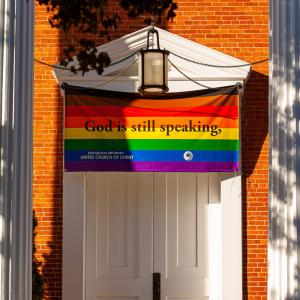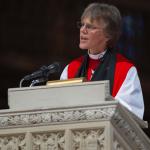Ever since Panaetius of Rhodes (185-110/109 BC) philosophers have recognized three modes of theological expression. These are: the poetic, the philosophic and the political. I have written in detail about each here. In brief, the poetic relates to the imaginative aspect of man’s thoughts about god, those that speak most powerfully to man’s existential concerns: meaning, purpose, and value. Consider Jordan Peterson as an example of someone who thinks about God, or god, in this mode. The philosophic mode deals primarily with our metaphysical and epistemic concerns. It considers what is or is not real, what can be shown or demonstrated to be true, and what are our moral obligations given those realities and truths. William Lane Craig or Richard Swinburne would be good examples of this kind of thinker.
Finally, there is the political, or civic, mode of theology, that “which maintains the traditional cult and is indispensable for public education.” (Copleston, A History of Philosophy Vol 1., 422). The political expression of theological ideas does not discount either of the other forms. But its chief aim is to organize society and see that it functions properly. This is given the societal fact that man is an inherently religious creature. Man is homo religiosus, or, homo credens, who knows intuitively that his social dealings must be grounded in something divine, something god-like.
In my last post on Bishop Mariann Budde, I touched upon the theology of leftist politics. I did so in an effort to expose what is essentially a heretical form of biblical Christianity: liberal theology. However, I want to be an equal opportunity heresy hunter. Therefore, in this two-part series, I will explain why the progressive Christianity we see expressed by the Left in America, mainly through the Democratic Party, as well as the Christianity we see articulated often on the Right, mainly through some MAGA-style conservatives, are both defective forms of orthodox Christianity. That said, let me say in advance that of the two the leftist heresy is far more radical in nature (meaning “at the root”) than the rightist. At the same time, the rightest heresy is more subtle, and, as such, can be harder to spot.
Left-Wing Theology: The God in Process
In my last post, I referenced the late Episcopalian Bishop, John Shelby Spong, as a paradigm example of leftist theology. When Spong wrote in his book Why Christianity Must Change or Die, the following about God, he was saying something axiomatic of liberal Christianity:
The God I know is not concrete or specific. This God is rather shrouded in mystery, wonder, and awe. The deeper I journey into this divine presence, the less any literalized phrases, including the phrases of the Christian creed, seem relevant. The God I know can only be pointed to; this God can never be enclosed by propositional statements.
The words of the Apostles’ Creed, and its later expansion known as the Nicene Creed, were fashioned inside a worldview that no longer exists….The way reality was perceived when the Christian creeds were formulated has been obliterated by the expansion of knowledge….If the God I worship must be identified with these ancient creedal words in any literal sense, God would become for me not just unbelievable, but in fact no longer worthy of being the subject of my devotion.
John Shelby Spong, Change or Die, 4
To put a finer point on Spong’s mysterious maxim about a god who cannot be captured by “propositional statements,” we have to get more academic. In his excellent book on the history of liberal theology, In a Post-Hegelian Spirit, Episcopalian theologian Gary Dorrien summarizes the thoughts of the 20th-century philosopher and theologian, Charles Hartshorne. Hartshorne, like many theologians in the first half of the 20th century, was working within a philosophical framework established by the eminent, British philosopher Alfred North Whitehead.
Whitehead’s “process philosophy” applied to theological concerns became known as “process theology.” This was itself a form of Hegelianism, going back to the last great system-builder in philosophy, G.W.F Hegel. In contrast to classical theism, theologians like Hartshorne, and later Spong, saw god as fundamentally different than the God of the historic creeds of the pre-Reformation Church. Dorrien clarifies each view:
Classical theism conceptualized divine reality as eternal, not temporal; active, never passive, wholly actual, never potential; necessary, not contingent; independent, never dependent; spiritual, not material; simple, not a compound; absolute, not relative to anything; causative, not effected by causes; and impassable, not affected by human feelings.
Gary Dorrien, Post-Hegelian Spirit, 285
The main historical proponents of this kind of “classical” theism were theologians like “Augustine, Aquinas, Calvin and Leibniz” (Dorrien, 285). In short, the two greatest ecumenical theologians in Church history, the most prominent theologian of the Reformation, and the greatest philosophical theologian of the early modern period; all of whom understood God in this classical sense, along with the vast majority of their predecessors and their successors, were all wrong.
With Whitehead’s view of god, which incorporates Hegelian and Darwinian ideas of evolution, theology changed for post-modern thinkers like Hartshorne:
In The Divine Relativity (1948), Hartshorne countered that God orders the universe by taking into God’s life all existing currents of feeling. God is irresistibly influential because God is distinctly open to influence. Why should God be less divine if God is acted upon by the world, subject to change, and truly personal….God is like an individual person in possessing an individual essence and a collection of accidents. That which is in God is not always in God’s essence….God is a supreme being whose being contains both the supreme unity and the supreme diversity, the supreme cause and the supreme effect, the supreme actuality and the supreme potentiality….In God, being and becoming inhere in a single reality; God is the supreme being whose being is inherently in process.
Dorrien, Post-Hegelian Spirit, 286 (Emphasis added)
The differences between classical theism and process theologies are irreconcilable. This is the root of the conflict between Left-Wing and Right-Wing Christians. On the former view, the classical view, God is eternal, pure actuality, absolute, independent of His creation, meaning, sovereign over it, and, with regard to substantive changes, not relational ones, is impassable. On this view, when we speak of the God of the Bible we are talking about a transcendent God whose moral commands do not change over time or, more precisely, because of time. This will matter greatly with how we see the intersection of Christianity and politics. After all, all that politics is, is the organization and enforcement of social morality.
Left-Wing Anthropology: God is With Us, And Is Us!
The theology of a God in process is the theology of the Episcopalian Church. This is the Church represented by Bishop Mariann Budde, as by Spong and Dorrien. Thus Budde’s god is the god who is both more than the world, but also part of the world. This is the same Hegelian version of god who is, along with the world, progressing in history: god becoming more and more fully god over the course of human events.
This version of god does not possess, for example, the “omni” attributes of classical theism. This god is not omnipotent, omniscient, or, perhaps, even omnibenevolent. Rather this panentheistic god is a being who can be influenced, affected, and changed by us. Thus, as we go, in some very real way, so too goes god. This god is far more like us than we think. He (she, it, they, them) is much closer to being a literal person. One might rightly, on this view, reverse the classical theistic mantra of “but for the grace of God go I,” and instead say, “but for the grace of me, or us, goes god.”
The inevitable consequence of this ontology of god is that god is whatever we think, or say, that god is now. But if this god, who is still ultimate in the sense of being the totality of all beings (not necessarily the source of all being), is different today than he was yesterday, but is also the ground of morality, then morality today is also different than it was yesterday. And, morality today is most certainly different than in the days of Jesus. This idea of morality was summed up by Hegel in the maxim: whatever is now, is right. In short, as god, or Geist, unfolds in the world process, history is always at a later stage of divine development. And, since the pinnacle of existence is man, as the societies of men develop and unfold, so too does god.
Finally, as god develops historically so too does morality develop, since morality is grounded in god. This Hegelian maneuver is commonplace among liberal Christians, and was most recently proposed, again, by the biblical scholars Christopher and Richard Hays in what turned out to be Richard’s final work: “The Widening of God’s Mercy.” Why is God’s mercy widening? Not because of what the Bible says, but because god himself is becoming bigger. Even the Hayses had to admit this maneuver.

Left-Wing Politics: The Consequences of A Progressive God
What are the political ramifications of a god who changes along with his world, a god who can be influenced and affected by us? There are three that matter to our current moment in American politics. First, is the idea that radical diversity is itself a part of god’s divine unfolding. Second, is that it is through the public expression and acceptance of that diversity that god’s unfolding nature is realized– manifested through us. Both of these, as I will show in my next article, differ significantly from the theology of rightist politics.
The third, however, is a consequence of the first two, and is shared with the god of, at least, some MAGA-style conservatives, albeit for different reasons. The third ramification is that there is no need for repentance before God. With regard to the Left-Wing view, repentance is not something we conduct before a transcendent and holy God, like the biblical God. Rather repentance is something we do only in reference to each other. Repentance, for the Leftist, is therefore not a religious act. It is not a vertical action that takes place between the individual sinner and God. For the Leftist repentance is a social and political act, a horizontal action that takes place only between individuals or groups. Of course, this repentance can be difficult to figure out since, if god is evolving along with us, then who or what is to decide who has sinned and, as such, is in need of repenting?
The first of these problems with progressive Christianity is marked by the perennial problem of the one and the many. According to Hegel, all contradictions would, in time, find their synthesis in the culmination of Geist. All of the diversity we see, especially in the social world of human beings, is supposed to be assumed into the divine oneness. Politically, this idea is seen most poignantly in the elimination of gender by the LGBTQ+ movement, as well as the elimination of sexual norms. The idea of fixed gender or of perennial sexual norms are themselves rooted in the idea that God doesn’t change, and, not changing, doesn’t change His moral will toward human beings. That is the God of classical theism, the God who is not affected by and through us and the processes of history, but who is eternal and whose will is perfectly good because He is perfectly Good.
The second issue is the concrete problem of expression of this view of god. This expression can only happen politically, and, as such, it makes Christianity explicitly political. If the evolving god evolves through us, then how we arrange, organize and express ourselves in society is how we come to greater and greater degrees of godliness. Thus, for many on the Left, to deter the process of the unfolding and evolving of god through us, is to be unrighteous and ungodly. It is, in the common parlance of many on the Left, to cancel god’s existence. “God” of course being very, very, much like us. To stop the transgender man from competing in woman’s sports is to say “no” to the evolution of god, which, will inevitably show that there are no real distinctions between the two.
Finally, as to the idea of repentance, since the metaphysical basis for morality, i.e., “god,” is ever changing and evolving, so too then is morality ever changing and evolving. Consequently, if there is no transcendent moral law that applies equally across time and over cultures, but if morality is relative to time and culture, then the only ones we need to repent to are each other. Or, perhaps for those less politically oriented, to the universe or to Mother Nature. H. Richard Niebuhr incisively captured this idea in his classic work Christ and Culture, when he addressed the “Christ of Culture” Christian:
Back of all these [liberal] Christologies and doctrines of salvation is a common notion that is part of the generally accepted and unquestioned climate of opinion. It is the idea that the human situation is fundamentally characterized by man’s conflict with nature. Man the moral being, the intellectual spirit, confronts impersonal natural forces, mostly outside himself but partly within.
Niebuhr, Christ and Culture, 101
Since liberal theology sees god as immanent in the world and evolving along with us, our primary conflict is not between a transcendent God and His moral law. Rather, our primary conflict is with nature: either nature out there or nature in us. Jesus, on this view, is not the Godman who comes into the world to repair a metaphysical and moral rupture between us and the Father. Instead, as Mariann Budde made clear, Jesus is, at least on some issues, the great moral teacher, the wise guru who gives us basic principles to live by, or, per Niebuhr:
When the issue in life is so conceived, it is almost inevitable that Jesus Christ should be approached and understood as a great leader of the spiritual, cultural cause, of man’s struggle to subdue nature, and of his aspirations to transcend it.
Niebuhr, 101
The transgender movement is a paradigm example of liberal theology politically expressed. On a classical theistic view, transgenderism is the desire to not conform to the reality of a nature designed by a transcendent God who Himself makes moral demands upon us. That would be the traditional political view as well. However, on the liberal view of theology, transgenderism is the natural aspiration to transcend the constraints of nature, and, in so doing, graduate to the next level of godhood.
Conclusion: Political Leftism is Theological Error of the First Order
A first order error in any system is one that affects every other part of that system. In theological liberalism, the first order error is that of getting the nature of God wrong. It is an ontological error. In getting god wrong, as seeing God as an evolving god, not perfect in his attributes, as subject to being affected, especially by us, and as incapable of bestowing upon us all the things we need for holiness and blessing, we become the very authors and determiners of this time and culture-bound god. Moreover, God’s revelation to us, both in the Bible and in the very Godman, Jesus Christ, also become time and culture-bound expressions of this Left-Wing God. These expression of god were good for their day, but irrelevant, or, at least, far less relevant for our own.
Theological Leftists like Mariann Budde, or Spong before her, or Hartshorne before him, can use God, god-talk, and even Jesus as means to influence the political environment, and remain consistent in their views, because for them god is a political being. God is literally part of the body politic. The Left-Wing God is a dynamic god who as we change and rearrange our society, changes and rearranges along with us. But this is not only a false god, it is hardly a god worthy of worship. In the next post, I will point out how another error, not quite as bad as that of theological liberalism, but still dangerous, has crept into right-wing politics.













